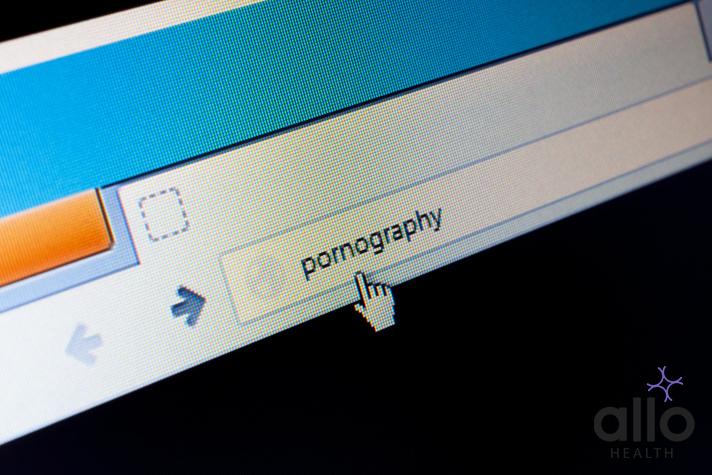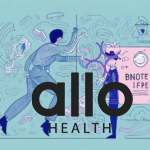Complexities of Porn and Masturbation Addiction

Allo Health is dedicated to personalized well-being, offering support and trusted information tailored to individual health goals. The platform emphasizes human-generated content, led by a distinguished medical team of experts, including physicians and sexual health specialists. Their commitment to credibility involves rigorous fact-checking, authoritative research, and continuous updates to ensure accurate, up-to-date information. Allo Health's unique approach goes beyond conventional platforms, providing expert-led insights and a continuous commitment to excellence, with user feedback playing a crucial role in shaping the platform's authoritative voice.

Dr. Aditi completed her undergraduate medical education at AJIMS, Mangalore, after which she worked in multi-speciality hospitals with COVID patients and in the Pain and Palliative medicine department. Driven by her experiences, she developed a keen interest in psychiatry. Dr. Aditi believes that mental health is just as, if not more important, than physical health.
Why This Was Upated?
Our experts continually monitor the health and wellness space, and we update our articles when new information became available.
Updated on 03 February, 2024
- Article was updated as part of our commitment to diversity, equity, and inclusion.

"The following blog article provides general information and insights on various topics. However, it is important to note that the information presented is not intended as professional advice in any specific field or area. The content of this blog is for general educational and informational purposes only.
Book consultation
The content should not be interpreted as endorsement, recommendation, or guarantee of any product, service, or information mentioned. Readers are solely responsible for the decisions and actions they take based on the information provided in this blog. It is essential to exercise individual judgment, critical thinking, and personal responsibility when applying or implementing any information or suggestions discussed in the blog."
Porn and masturbation addiction have become increasingly prevalent topics in today’s society, impacting the lives of countless individuals. As the accessibility of explicit video material has surged in recent years, it has given rise to concerns about the potential negative consequences on mental health, relationships, and overall well-being. In this article, we will delve into the intricate world of excessive masturbation and porn addiction, exploring the signs, effects, and treatment options for these compulsive behaviors.
What is Porn and Masturbation Addiction?
Porn and masturbation addiction, also known as compulsive sexual behavior, involve uncontrollable urges and excessive engagement in sexual activities, often causing distress and impairing daily lives. These behavioral addictions can lead to mental health conditions such as hypersexuality disorder or obsessive-compulsive disorder.
Signs of Addiction:
- Signs of masturbation addiction include compulsive behaviors, excessive masturbation, and an uncontrollable urge to masturbate.
- For porn addiction, signs may manifest as the frequent use of internet porn, persistent sexual fantasies, and withdrawal symptoms when trying to quit.
Causes of Porn and Masturbation Addiction:
- Accessibility of porn can contribute to addiction, as explicit video material is readily available online.
- Mental health concerns, including hypersexuality disorder or substance use disorders, may predispose individuals to these addictions.
- Lack of sex or sexual dissatisfaction can drive individuals to seek sexual pleasure through excessive masturbation.
- The brain’s response to porn and masturbation, involving pleasure hormones and changes in brain activity, can reinforce addictive behavior.
- Stress, boredom, or emotional triggers may lead to unhealthy masturbation compulsions as a coping mechanism.
Impact on Daily Lives:
- Addiction can disrupt personal and professional life, causing a breakdown in relationships and affecting overall well-being.
- Feelings of guilt, negative consequences on health, and a diminished quality of life are common among those struggling with these addictions.
Seeking Help:
- Diagnosis for masturbation addiction and pornography addiction can be obtained from a mental health professional.
- Treatment options include therapy with a sex therapist and support groups to address the root causes and develop coping strategies.
Porn and masturbation addiction involve compulsive sexual behaviors with detrimental effects on mental health and daily functioning. Recognizing signs and seeking professional help are essential steps towards recovery and a healthier, more balanced life. Various factors, including accessibility and underlying mental health conditions, contribute to the development of these addictions. Addressing these concerns is crucial for individuals seeking to regain control over their lives and sexual habits.
Factors Contributing Porn and Masturbation Addiction

Porn and masturbation addiction, like many behavioral disorders, can be influenced by various contributing factors. These factors often interact in complex ways, leading to the development and perpetuation of these compulsive behaviors. Here are some key factors to consider:
- Accessibility of Porn: The easy access to explicit video material on the internet can trigger and sustain compulsive porn use, leading to porn addiction. With the internet, porn is now just a click away, increasing the risk of addiction.
- Compulsive Behaviors: People with underlying obsessive-compulsive tendencies may find themselves repeatedly engaging in excessive masturbation and compulsive porn use.
- Mental Health Condition: Individuals with preexisting mental health concerns, such as depression or anxiety, may turn to excessive porn and masturbation as a coping mechanism.
- Stress and Coping With Life: Stressful life events or an inability to cope with life’s challenges can drive individuals to seek solace in porn and masturbation.
- Hypersexuality Disorder: Some individuals may suffer from hypersexuality disorder, characterized by an excessive focus on sexual thoughts and behaviors, which can contribute to excessive masturbation and porn addiction.
- Social Isolation: Loneliness and social isolation can lead to increased engagement in porn and masturbation as a way to fill the void in one’s life.
- Lack of Sex: A lack of sexual satisfaction or opportunity for sexual intercourse can lead to compensatory behaviors such as excessive masturbation.
- Pleasure Hormones: The release of pleasure hormones during sexual activities, including masturbation, can create a reinforcing cycle, making it challenging to break free from addiction.
- Normalization of Porn: The idea of pornography addiction is often downplayed in society, which can make it difficult for individuals to recognize they have a concern.
- Accessibility of Porn Can: The convenience and privacy of accessing porn can make it difficult for individuals to resist the urge, contributing to addiction.
These contributing factors interact differently for each person, making it important for individuals struggling with porn and masturbation addiction to seek help from a mental health professional who can provide tailored treatment and support (mental health professional). Understanding these factors is a crucial step in addressing and overcoming these addictive behaviors.
Effects of Porn and Masturbation Addiction on Sexual Health

Porn and masturbation addiction can have detrimental effects on sexual health, leading to a range of physical and psychological consequences.
- Decreased Sexual Satisfaction: Excessive masturbation and porn consumption can desensitize the brain’s pleasure centers, making it difficult to derive satisfaction from real sexual experiences.
- Negative Impact on Intimate Relationships: Individuals struggling with these addictions may prioritize their compulsive behaviors over their partners, resulting in emotional distance and dissatisfaction in sexual relationships.
- Compromised Physical Health: Excess masturbation can lead to physical concerns such as soreness, erectile dysfunction, and decreased testosterone levels, affecting one’s ability to engage in sexual intercourse.
- Unhealthy Sexual Desires: Porn addiction can distort one’s perception of healthy sexual desires, leading to unrealistic expectations and a reliance on explicit video material to achieve arousal.
- Mental Health Concerns: Both porn and masturbation addiction are associated with mental disorders like obsessive-compulsive disorder (OCD), hypersexual disorder, and substance use disorders, further exacerbating sexual health concerns.
- Breakdown in Relationships: Compulsive behaviors around masturbation can cause a breakdown in intimate relationships, as partners may feel neglected, leading to conflicts and emotional stress.
- Decreased Libido: Regular exposure to explicit material can lead to a decrease in sexual desire in real-life scenarios, making it challenging to maintain a healthy sex life.
- Feelings of Guilt: Many individuals with these addictions experience feelings of guilt and shame, which can create psychological barriers to sexual satisfaction and fulfillment.
- Impact on Sexual Activities: Those addicted to porn and excessive masturbation may struggle to engage in diverse sexual activities or explore their sexuality, limiting their overall sexual experience.
- Resistance Level Increases: Over time, resistance to normal sexual stimuli increases, making it even more challenging to engage in healthy sexual activities.
Porn and masturbation addiction can significantly disrupt sexual health by diminishing satisfaction, causing relationship concerns, affecting physical and mental well-being, and altering sexual desires. Seeking professional help and adopting healthier sexual habits are essential steps to mitigate these negative consequences and restore a balanced and fulfilling sex life.
Treating Porn and Masturbation Addiction
Treating porn and masturbation addiction involves addressing the underlying psychological factors and implementing behavioral changes. Here are some essential steps and strategies for effective treatment:
- Diagnosis for Masturbation and Pornography Addiction: Begin by seeking a professional diagnosis from a mental health professional or addiction center. This will help determine the severity of the addiction and guide the treatment plan.
- Role of a Sex Therapist: A qualified sex therapist can play a crucial role in treatment. They can help individuals understand the root causes of porn addiction, whether it’s related to mental health concerns like obsessive-compulsive disorder or hypersexuality disorder.
- Behavioral Therapy: Engage in behavioral therapy to identify triggers and compulsive behaviors associated with excessive masturbation and porn addiction. Cognitive-behavioral therapy (CBT) can be particularly effective in addressing these concerns.
- Treatment for Masturbation Addiction: For individuals struggling with compulsive masturbation, setting realistic goals to reduce frequency is essential. Replacing unhealthy habits with healthier ones, like exercise or hobbies, can be beneficial.
- Treatment for Pornography Addiction: Managing pornography addiction may involve implementing website filters, limiting internet access, and gradually reducing exposure to explicit material.
- Support Groups: Joining support groups or therapy groups with individuals facing similar concerns can provide a sense of community and encouragement throughout the recovery process.
- Resisting Triggers: Develop strategies to resist triggers that lead to compulsive behaviors. Increasing awareness of these triggers and practicing resistance techniques can be empowering.
- Lifestyle Changes: Make positive changes in your daily routine and personal life to reduce accessibility to porn and masturbation. This might include setting strict boundaries on device usage or engaging in social activities.
- Healthy Sexual Habits: Focus on cultivating a healthy sex life, including open communication with a partner, exploring intimacy, and addressing any unresolved sexual desires or concerns.
- Medical Support: In some cases, medication prescribed by a healthcare professional may help manage underlying mental health conditions or reduce compulsive behaviors.
Remember that overcoming porn and masturbation addiction is a journey that requires commitment and patience. It’s essential to seek professional guidance, lean on support networks, and gradually implement these strategies to regain control over your life and achieve a healthier balance in your sexual habits.
Conclusion
Excessive masturbation and porn addiction are complex concerns that affect the lives of people across the globe. Understanding the signs and symptoms, seeking professional help when necessary, and adopting healthy sexual habits are crucial steps towards recovery and maintaining a fulfilling life. By addressing these concerns openly and honestly, we can work towards breaking the stigma surrounding addiction and promoting mental health and well-being in our society.
Most Asked Questions
-
What are the signs that I might have a masturbation addiction?
If you find yourself unable to control the urge to masturbate, doing it excessively, or feeling guilty about it, these could be signs of addiction. Seek help if you think you may have a concern.
-
Can porn addiction affect my mental health?
Yes, excessive use of pornography can impact your mental well-being, leading to guilt, relationship concerns, and other mental health concerns. It’s essential to be aware of these potential consequences.
-
How can I seek help for masturbation or porn addiction?
You can start by talking to a mental health professional or sex therapist. They can diagnose the concern and provide guidance on treatment options tailored to your needs.
-
What can I do to maintain a healthy sex life and overcome these addictions?
Focus on sexual satisfaction, communication in your relationships, and seeking support when needed. Breaking unhealthy habits is possible with the right strategies and professional assistance.






































